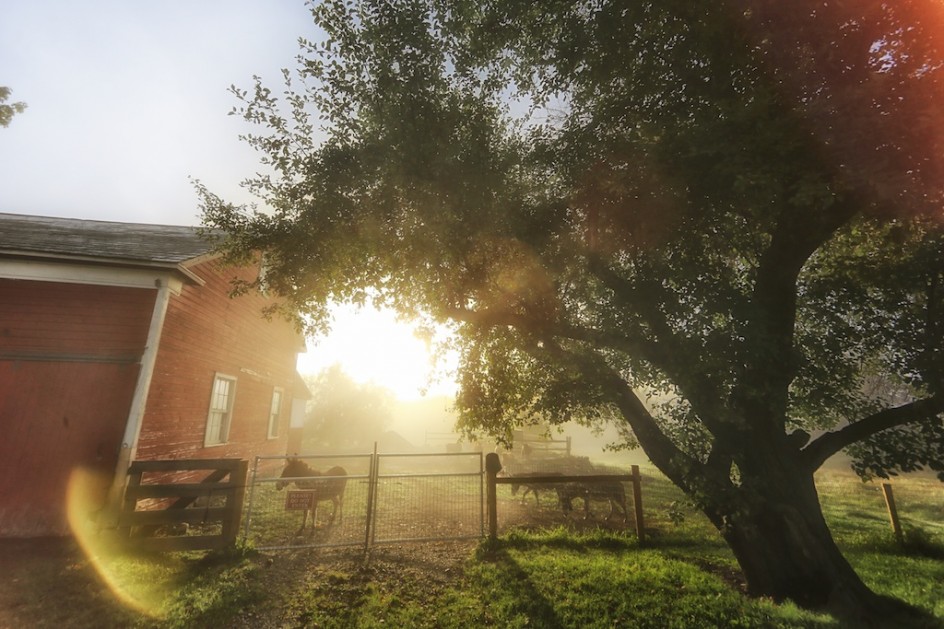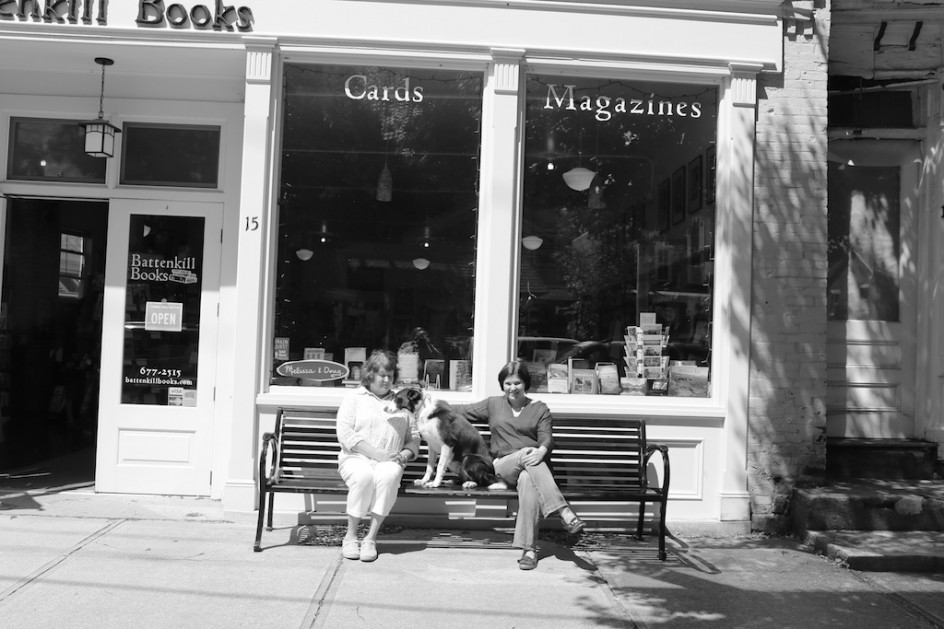
Bedlam Farm 2.0. The scale is different from the first Bedlam Farm, it needed to be different.

Working dogs, especially working dogs on farms, come down with all sorts of stuff. It is not a crisis, it is just part of sheepdog’s life. I spent a lot of time with Red and noticed several things about him recently. He has been losing weight, even though he is eating high protein, high calorie Fromm Food, the kind recommended for working dogs. He has been biting and scratching around his neck and back.
Border collies are notoriously stoic and his energy has been high, his work with the sheep as intense as normal. When I noticed a lot of scabs on his back, some of them swollen and, I thought a bit infected, I took him to the vet, Dr. Colleen Flaherty. She checked Red, asked for a stool sample (no problem) and we decided that the black flies that have been swarming around the pasture were feasting on Red when he lay still holding the sheep during our morning chores. The flies have been horrendous this year, horse flies as well as black flies, no see’ ums and gnatsThey torment the donkeys, who go into their stalls in the daytime to avoid them, but Red never moves when he is working and I’ve noticed clouds of flies swarming over him.
I got some medicated shampoo and have bathed him every day, then some antibiotics for the possible infections, and three days of cortisone pills to ease the swelling and scratching. Those have worked beautifully and the wounds have almost entirely healed and Red has stopped biting and scratching. Today the stool sample results came in and Red has Hookworm and some other relatively harmless parasites, so we got some more medications – in powder form – to sprinkle on his food for several days Red already looks as if he’s gained a bit of weight, I think the hookworm comes from his eating some chicken droppings in the yard, this is also common when dogs are around chickens or sheep.
It is good to figure all this out and treat these issues. I’m going to test him for Hookworm several times a year, it will probably recur. Tonight, we both did our medicines together – I took my insulin shots, Red his antibiotics and cortisone pills. This is normal dog life on a farm, not a drama or big deal, and I will not be providing updates on his recovery, it does not rise to the level of that. I want to be more vigilant about flies next summer, but truthfully, that is part of a working dog’s life. Red is looking good, doing well. Thanks, but I don’t need advice or other remedies or special formulas, we are handling it. Just wanted to share this turn in A Dog’s Life, my new regular column.

I came downstairs early this morning and looked out the window – it was before 7 – and I saw the run rising up over the pasture and cutting through the fog. This is photographer’s light, I love this light and you photographers will understand that this shot is only good for a few minutes, once the sun burns brighter the fog will clear up quickly, so I grabbed my Canon and ran outside, not quite realizing or even thinking about the fact that I was naked. I ran out to the pasture, opened the gate and started shooting. Red, who had run outside with me was looking at me curiously and that’s when I realized I had no clothes on, no shoes, not even a robe.
I turned around, convinced I was shrouded in fog, but as happens up here, the fog was ahead of me not behind me and people driving to work, poor souls, had a good view of me and the pasture. A few waved, a couple honked. What the hell, I thought, I was already out there, already outed (I started thinking about cell phone photos of me on Instagram) so I took a few more shots and started backing – discreetly, I thought – towards the house, then I rushed in, Red behind me, as Maria came out the door.
There might be a shot or two on Instagram, if so, my best advice is to avoid it and get to the cute animal photos.
“Did you get anything good?,” she asked, not even mentioning my not having any clothes. She just laughed and noticed the fog. “This,” she said, “is why I love you.” This, I thought, is why I love you.

The gifted writer and filmmaker Sherman Alexie made big splash in the publishing world this week when he wrote an open letter urging writers to sign up for the “Indies First” campaign and spend a day in bookstores hand selling books to help out Independent bookstores. It is very good and fashionable these days for writers to support independent bookstores – I am one of them, I have been hand-selling books in my local bookstore for six months and it has been a happy and successful experiment all around.
I had an odd response to Sherman’s open letter, I felt balky about it. If Connie Brooks wants me to go into her store for a day, I’ll be there. But it seems a bit narrow to me, a bit too easy.
Ever since the big books chains began to fall and flounder, the independent bookstores have been having a resurgence, and one reason, I think, is that they are learning to support readers rather than bookstores. It might be a good idea for writers to do the same thing. Bookstores are working hard to re-connect with their communities, be more efficient, understand readers, economics, social media, blogs and marketing. This is where our readers are, they are not sitting in bookstores waiting for us to hand sell them books. I am not into writing open letters, really. I do often wonder when writers and publishers will get around to supporting readers, to perhaps spending a day or two buying and reading books with them, seeing what they can afford what they like, maybe it would help them understand why Amazon has driven so many publishes and bookstores to the wall.
And who, exactly is supporting readers? I don’t see any Reader’s Day in the works. Jeff Bezos, who started Amazon, knew publishing’s hidden secret: most Americans didn’t go into bookstores, didn’t feel comfortable there, couldn’t afford them or didn’t like them. He understood that publishing was essentially an elitist business, books were not for everybody, lots of people didn’t understand them, couldn’t afford them. Bezo didn’t care what the bookstores or publishers liked, he figured out what readers like. One thing they liked very was ordering $8 books in bed in less than a minute and getting enormous discounts on the paper books they liked. Or taking their Kindles on an airplane or on vacation with three kids.
Bezos offered books that could be purchased conveniently, that permitted readers to browse easily from their homes, and offered them inexpensively. He brought millions of new people into book buying and reading, he has done more for publishing than any other single force. I am not into corporate monopolies, but I have this feeling it is readers who need to be supported, not just bookstores. Given a choice, people voted for Amazon. That is the way capitalism works, whether we like it or not, or whether it makes us comfortable or not.
People like me always loved bookstores, we grew up around books, had the money to buy hardcover books and had bookstores all around. I took my daughter to a bookstore before she could walk, and I bought hundreds of dollars of books for her, sometimes in a given month. That was not the case for most Americans, I have seen surveys from the 1970’s that found that only 20 or 30 per cent of Americans ever went into a bookstore, before Amazon, Barnes & Noble, or the struggles of Indie stores. Serious book buying was always a passion of the educated middle-class.
Since I began writing this blog and working online, I have been in a continuous dialogue with my readers. This has transformed my life and my work. I think every bookstore owner and publisher ought to do the same. The writers I know resist and resent blogs and most of the bookstore owners I know aren’t fond of the Internet either and are only beginning to figure out how to use it. Bookstores are, by definition, proprietary and no especially interactive. Most readers are.
For years now, I have heard my reader’s concerns about cost, their sense of exclusion from prevailing literary tastes, their distaste for gratuitous violence and the ponderous and depressing novels New York publishers love to buy and publish. I hear how many feel foolish and uncomfortable in bookstores, find the staffs there aloof, even arrogant, their shelves confusing. Most readers I know don’t read the New York Times, don’t listen to NPR, aren’t following the Indie List.
And almost every day, I hear their deep concerns about the cost of hardcover, even paperback books. Even before 2008, the vast majority of Americans were feeling squeezed economically. After the Great Recession many book readers and book lovers came under even more pressure. I saw how many people struggle to pay a $5 subscription to my blog, so I offered a $3 subscription and was overwhelmed with messages of gratitude. If people can’t afford $5 a month subscriptions to a website, how are they supposed to buy $30 books two or three times a month? I didn’t see many bookstores or publishers acknowledge this or respond to it very forcefully. I am writing books and selling them for $2.99 online. That is one way I am listening to my writers. I make them available digitally. They are less formal and cumbersome that traditional book publishing.
I have not heard many writers, bookstore owners or publishers speak to the problems and concerns of readers – they seem too focused on trashing Amazon, complaining about digital publishing and convincing the independent bookstores that they really love them. Like newspapers, publishers like to be the ones who decide the agenda, and people can take it or leave it. I love bookstores too, as many of you know. I am close friends with Connie Brooks, my town’s bookstore owner has charged bravely into the new world of publishing, connecting to the community, selling books online, drawing writers into her store. But I have often been uncomfortable in bookstores and bookstores, like writers, are not charities. They cannot ask people to support them because they want to be supported. They have no right to demand that readers forego their own tastes, convenience or economic welfare because they exist and are deemed wonderful. They will have to change just like I do and enter into a true and continuing dialogue with readers of books if they really wish to survive.
So what exactly does supporting readers mean? Newspapers blame the Internet for their demise, I blame newspapers, who became so remote and bland and uninteresting that their readers abandoned them in droves once they had any kind of choice to make. The Internet allows people to pursue their own agenda, not that of corporate media or publishing interests. Writers need to come out of their caves and talk to their readers, yes, even open up their houses to them. My readers have taught me much about my writing, how to be relevant and improve it. They support me and my work by subscribing to my blog and listening to my podcasts, and they also support my local bookstore. Supporting readers means giving them a voice in the process of writing and publishing, it means understanding the pressures they are under, it means working hard, as Connie Brooks has done, to make bookstores more inviting, booksellers more helpful and informed.
I remember every day as a writer that as much as I love bookstores, and my local bookstore, it my readers I need to love the most, my readers I need to listen to, my readers I need to support and connect with. Bookstores are one part of publishing, they are not the only part of publishing that needs support. People mistake the troubles of bookstores with the troubles of publishing. Stories and books are doing well, perhaps entering a Golden Age of reading and story-telling. Alexie Sherman is calling his support-the-bookstore initiative “Indies First.” I hope I never write an open letter to anybody but if I do, it will be different. Our readers do not serve us, we serve them. Our readers come first. That is the message of the new publishing, the point of interactivity, the legacy of social media and the Internet, which brings so many good things and bad. That’s my new job as a writer.

Please don’t die again,
the world can be a dangerous place,
it can drown the lazy, the self-righteous,
the angry and the fearful.
The sun is your life raft,
your parachute,
your secret tunnel to life,
say it aloud, brothers and sisters,
silently as you walk, breathe, rest.
I won’t die again,
The sun is my lover.